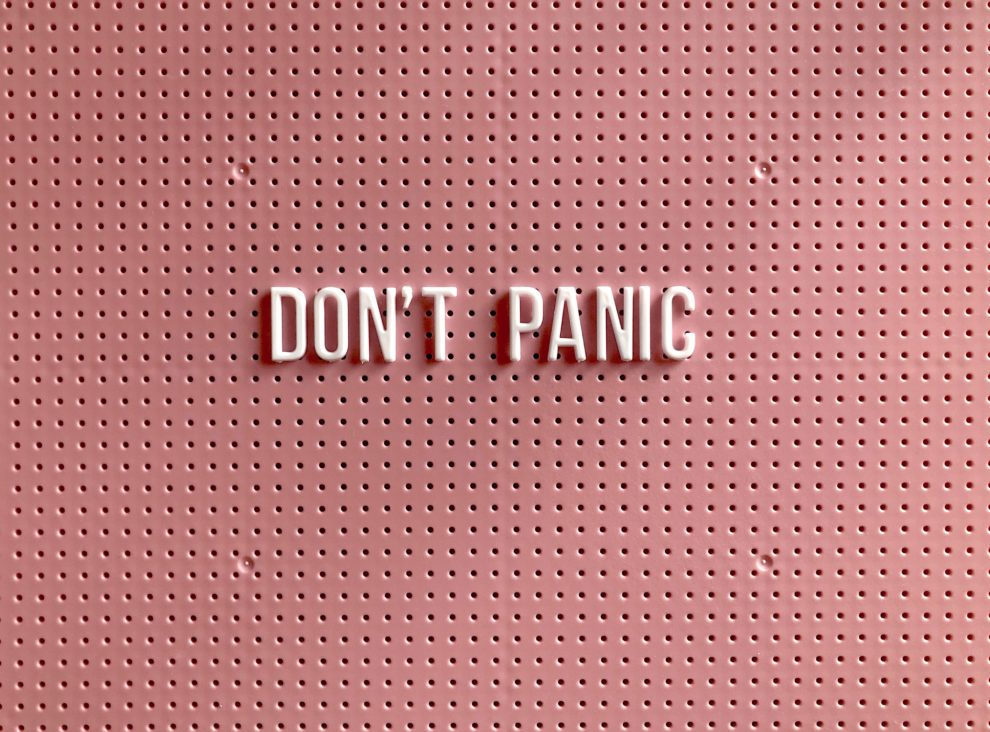Over the last three weeks, as the COVID-19 pandemic began to disrupt people’s lives in significant ways I started seeing comments online like, “The pandemic of fear is worse than the virus.”
I’m not going to lie, this sentiment pushes my buttons. It feels dismissive and that bothers me.
How could you possibly know that? Don’t you care about the vulnerable?
What about my chronically ill friend who was struggling to breathe so much that his sister decided to call an ambulance? Is the fear worse than the virus for him?
What about the woman who just died alone in the hospital without any visitors? What about her husband who just lost his wife without a chance to say goodbye? Was the fear worse for them?
But after I considered the statement in a more levelheaded way, I realized that although it reflects an unhealthy relationship with fear, it is not entirely untrue. For a lot of people, those who never get the virus or only experience mild symptoms and those who struggle with crippling levels of extreme anxiety, the fear is worse than the virus.
I also realized that many people resonate with these kinds of statements because widespread social distancing is impacting them in tragic ways. People are losing jobs and struggling to make ends meet. Others are trapped at home with abusive parents and spouses. These present realities are understandably more urgent than the threat of some theoretical future illness.
In the grand scheme of things, I don’t know if the fear will end up being worse than the virus or if the virus will end up being worse than the fear. But I still believe statements that make fear out to be the primary enemy are misguided. Like it or not, we do live in a world full of danger and pain. Maybe it won’t be COVID-19, but there are things out there that can live up to our fears.
For the person who loses her job, the fear of losing her job was not worse than the reality of not being able to put food on the table.
For the woman stuck at home with an abusive spouse, the fear of being trapped with an unsafe man is not worse than the reality of his cruelty.
For the man struggling with each breath, the fear of catching the virus is not worse than the reality of gasping for air through painful lungs.
Since this is the world we live in, I would like to suggest we develop a more gentle and comfortable relationship with fear.
Fear is natural and useful
Feelings of fear are not wrong or evil. They are natural. Fear is the appropriate response to danger. At their best, feelings of fear alert us to a threat, energize us to take decisive action to protect ourselves and others, and fade away when the danger has passed.
My husband experienced this kind of fear last summer when our boxer, Beezus, was attacked by a wild boar during one of our desert walks. His fear enabled him to immediately grab a large rock, throw it perfectly to hit the boar’s eyeball, and take his shirt off to stop the blood gushing from Beezus’ neck while calling for me to come hold it, all in less than a minute. Then he quickly looked over the edge of the bank to be sure that the boar was really gone and sprinted 1/2 mile home to get help.
When it comes to health threats, this kind of fear can motivate us to seek out accurate information, take appropriate preventive measures and then continue living without worry.
To use another personal example, we recently moved into an area with a lot of rattlesnakes and black widows. I’d never lived in a place with so many venomous creatures before and was appropriately nervous about it. This anxiety motivated me to read about the snakes and spiders in our area, learn about how to avoid bites and how to respond if bites do happen. Now, I don’t really worry about the snakes and spiders anymore. They are still a threat but I know not to stick my hands in places I can’t see, I know to watch where I’m stepping and I know not to let my dogs dig through brush piles. I also have plenty of Benadryl on hand in case an emergency does occur. I’ve done what I can do and the rest is outside of my control. I can relax about it now.
If I’d had a similar concern about wild boars, we would have known not to walk in the evenings with off-leash dogs and Beezus’ terrible injury, which almost took her life, would have been avoided.
Of course, fear doesn’t always work so beautifully, which brings me to my next point.
Fear, even misplaced fear, should be met with curious compassion
There are times when fears are misplaced or exaggerated. Additionally, anxiety and worry tend to be less helpful and more crippling forms of fear. This is a legitimate problem and I’m not saying that we should embrace these unhealthy and debilitating fears. I think it’s right to seek solutions and peace.
I don’t think this means we should rush in to stab our fears with positive thoughts or Bible verses, however. I think it’s usually more helpful to approach our fears and anxiety with calm and compassionate curiosity. Emotions, even negative emotions, have something to say to us. Fear, even misplaced fear, is giving us important information. We should listen and ask intelligent questions before deciding how best to pursue peace.
Is this a real threat? Is there anything I can do about it? If the answer is no (and we shouldn’t just assume that it is), we might need to dig a little deeper.
Why am I afraid? Is there a hidden reason for my fears?
Take the example of a teenager who is fearing her upcoming final exam.
Is it because she hasn’t been paying attention and doing the assignments? Is it because she will fail the class if she fails this test? Sometimes fear can alert us to ways we’ve been unwise and irresponsible.
Is it because she thinks her worth as a human being is tied to her perfect grades? Is it because pleasing her teacher is the most important thing in the world to her? Sometimes fear can alert us to false beliefs we have and ways we are valuing things inaccurately or exaggerating the importance of someone or something.
Or maybe the girl’s parents are cruel and exacting. Maybe they will become angry and abusive if she brings home a bad grade, just like they become angry and abusive whenever she makes any other mistake. In that case, her literal safety is affected by how well she does on this exam and seeking peace will be about getting help not about adjusting her habits or beliefs.
Or maybe the teacher is doing a bad job teaching. Maybe he uses shame and intimidation to motivate his students. If so, it’s the teacher who needs to be held responsible and probably fired.
Even in situations where the fear doesn’t make much sense and the reasons elude us, I think it’s worthwhile to dig deeper.
I used to suffer from severe panic attacks. I’ve since learned that when most people refer to having panic attacks they don’t mean the kind of panic attacks I had. Mine lasted for hours and I experienced the bodily sensations of sheer terror, often without fearing anything specific or even knowing what triggered it. I would scream, hyperventilate and hide in the closet. At some point, I would come down from it, become myself again and wonder that I could have behaved so irrationally.
Eventually, I discovered that these panic attacks were caused by exposures to a specific physical trigger that was causing inflammation in my brain. Now, as long as I avoid those exposures, I can stay in my right mind. I don’t have to suffer in this way anymore.
Past trauma can also cause us to experience fear that appears irrational. This can happen anytime a trauma survivor encounters a trigger that reminds the body of the original event, even if the person is not consciously aware of the memory. This means that things as benign as a certain color, place, smell, sound or tone of voice could trigger legitimate fear in the absence of real danger. This is more common than you might think, and it isn’t just memories of war or severe abuse that can be stored as trauma. A situation like this is probably going to call for a skilled professional therapist.
What about trusting God? A note to my Christian friends.
Brothers and sisters,
I used to think that trusting God meant squashing my fears before giving them a chance to speak. I used to think it meant believing that God wouldn’t let the things I was worried about actually happen to me. I used to think that anxiety was a sin.
Then horrible things happened to me. I fell severely ill. At age 19, I lost all my dreams and plans for the future. I suffered tremendous pain in my body. I lost one ability after another. I went from being an aspiring ballerina to being bedridden. I became a burden to my husband and family. For years, it was just about daily survival. My family wondered if I would make it.
When I began to recover, I had some rethinking to do.
What does it mean to trust God?
I’m pretty sure it doesn’t mean believing he will always keep bad things from happening. I don’t think it means believing that he will make the painful things easy to endure either. It certainly doesn’t mean that we don’t need to be wise or wrestle with difficult issues.
I think it means believing that He is good and that He is with us. I think it means trusting that when our worst fears come true, He will be there, giving us the strength to press on and preparing the way for goodness and beauty to grow out of the suffering. I think it means that instead of setting our hopes on a particular earthly outcome, we set our hopes on the future resurrection. I think it means we keep praying and loving, even when we are in pain.
I actually feel less afraid of unexpected suffering now, because I know that even the darkest seasons are not without moments of light. Somehow the urgency of pain makes love and joy that much more poignant. The little things become precious: a lovely yellow flower, a handwritten love note, the wag of a happy puppy’s tail. I also know that certain kinds of personal growth and human connection can’t come apart from suffering. And I know the pain doesn’t last forever. Life may never look the same again but it’s possible to heal, even in this life. It’s possible to receive new blessings, even when things aren’t completely restored. All these good gifts are from God.
What about when Jesus said “don’t worry about tomorrow” and told us not to worry about what we will eat and what we will wear? Isn’t he saying that anxiety is sin? What about all the “fear not” verses?
When we soothe a frightened child, saying, “Don’t worry, he’s a nice doggy” are we rebuking or comforting? I think Jesus’ words are intended to be received primarily as comfort not necessarily as a rebuke or a command. There’s a gentleness here. Jesus is telling us that we don’t need to worry because God sees our needs and he cares for us. We can prioritize seeking His kingdom and we can be generous without worrying about lacking basic food and clothing. God knows we need those things.
Certainly, worry can lead to sin if we respond poorly. I think it’s clear from the context that Jesus is warning that worry, about possessions in particular, can lead us into greed and make us “slaves of money.” It can cause us to neglect good works and become self-protective at the expense of others (*waves to the toilet paper hoarders*).
But no, I don’t think he’s saying that the single mother who just lost her job and is worried about how she’s going to feed her children is sinning. I don’t even think he’s saying it’s a sin for my husband to be concerned about the economy and working hard to care for us and his employees during this uncertain time. I do think it would be a sin for us to stop being generous. I do think it would be a sin if we started prioritizing making money over living righteously. I do think it would be a sin if we started hoarding and stockpiling more resources than we honestly need.
There are many other verses in the Bible about not being afraid. I’m not a theologian and I can’t cover them all in detail here. I will say this, I think if you look at the passages in context you will find they are intended to comfort and reassure. Often they are reassurances to specific people about a specific danger, trial or mission they are being asked to face. Other times they are words of comfort that can be applied more generally.
I don’t think there’s warrant to conclude that these verses are teaching a commandment or warning against the sin of fear. I think the far more natural conclusion is that God wants us to know he understands human frailty and cares about human fears. We don’t need to be shy about bringing our fears to God in prayer. I think we can also conclude that God believes humans are actually capable of facing danger courageously and living faithfully in a world of suffering and that he is willing to help us do that.







